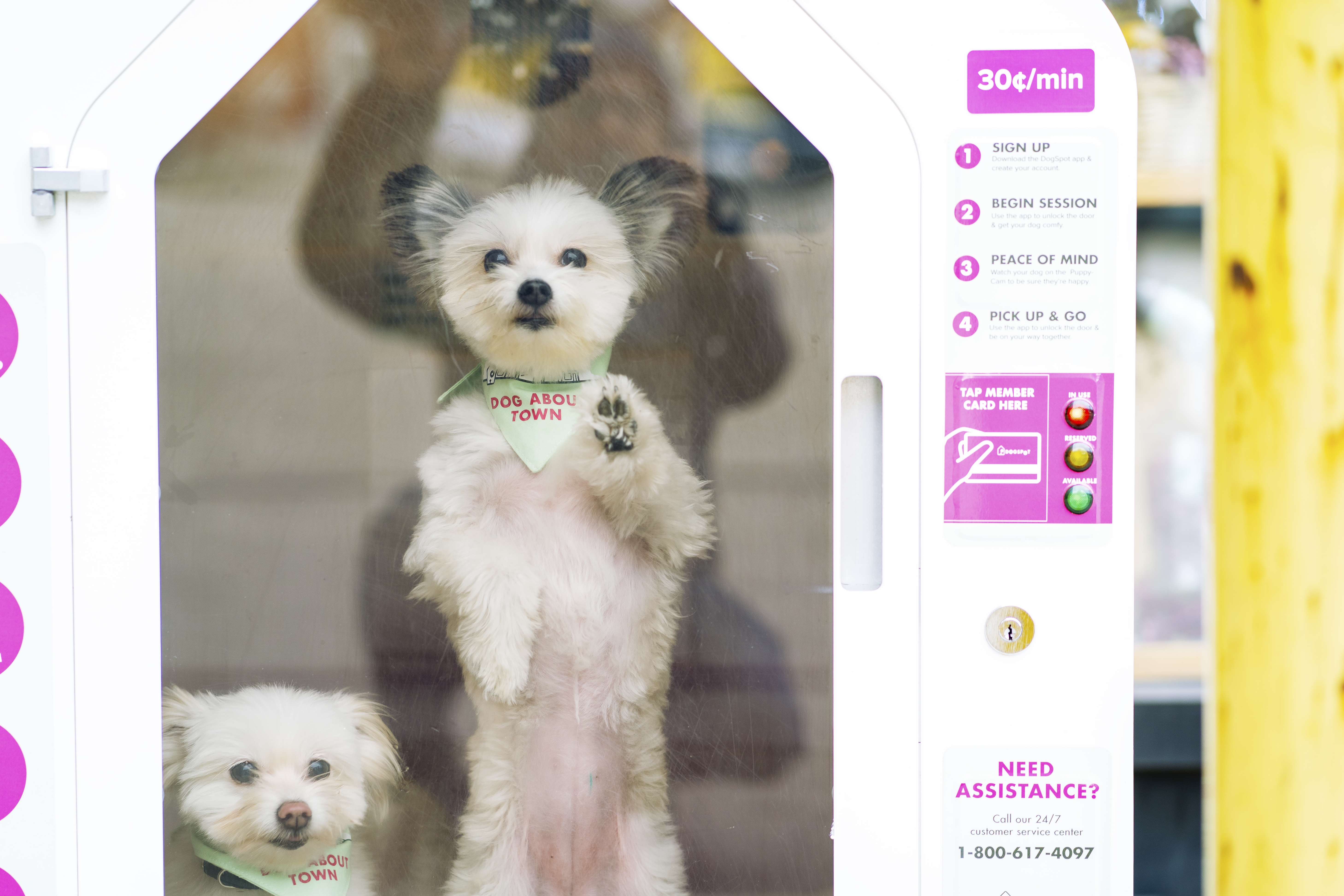At a corner shop in Brooklyn, frosty gusts off the East River recently laid waste to morning errands.
Moms mad-dashed into the store, frantically nudging their fleece-swaddled toddlers out of the 40-mph gale. At a rear door, deliverymen pushed carts lined with happy flowers while frowning against the mean chill.
But much, much worse, the wintry blast mercilessly flapped the ears, crinkled the eyes and rumpled the fluffy faces of Coconut and Katie, two tiny pups precious enough to be almost famous on Instagram.
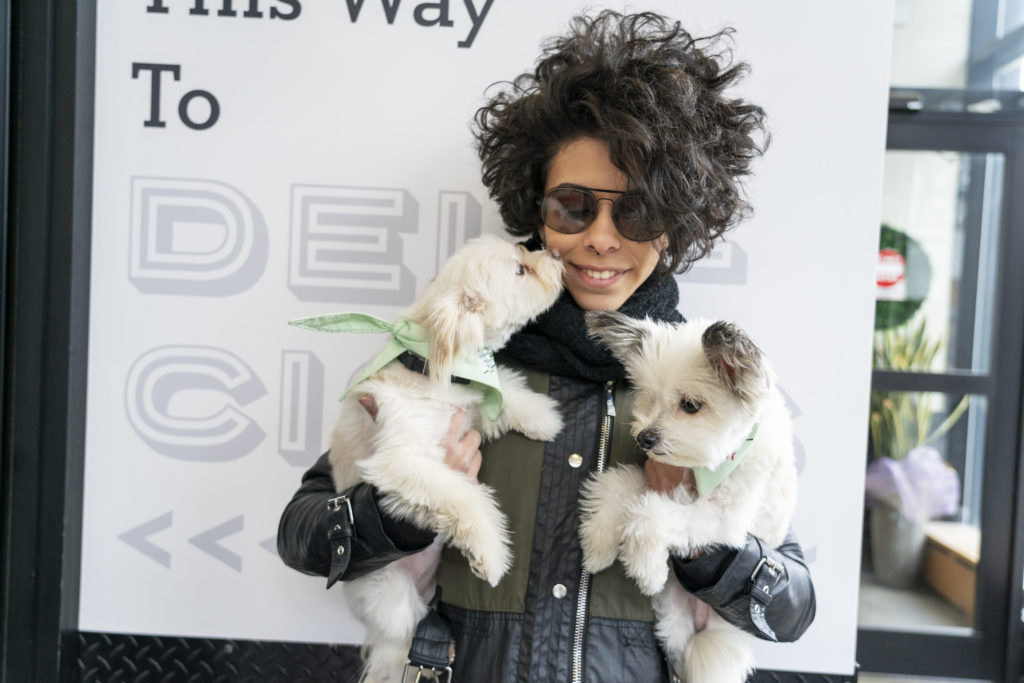
Kay Prieto holds Coconut, left, and Katie outside a Brooklyn market.
“This wind!” shrieked self-described dog mom Kay Prieto as she transferred Coconut and Katie from her warm arms onto to the sidewalk. She then opened the door to a high-tech doghouse called DogSpot and watched them scurry inside.
Moments later, Prieto, too, was out of the cold, strolling the aisles of City Acres Market to gather groceries. She glanced at a phone app to see her 6-year-old Pomeranian mixes peering out the shatterproof window – and to note that the unit’s temperature was a cozy 65 degrees above its heated floor.
“They love it!” says Prieto, who lives in Manhattan and often visits Brooklyn via subway. “I want to bring them everywhere. Having DogSpot allows me to bring them places where I can’t necessarily take them inside, like the supermarket. Now they get to come with me more often.”
Coconut, Katie – and Prieto, of course – are among a growing number of pooches and dog owners who use DogSpot’s cloud-connected doghouses outside stores, restaurants and malls across 14 states.

Chelsea Brownridge.
DogSpot describes its shelters as “smart sidewalk sanctuaries” that offer a safe, clean retreat for strolling pups whose owners must duck into businesses where dogs are prohibited – a one-of-a-kind alternative to tying up pets or leaving them in the car. Manufactured in New Hampshire, the structures also are air-conditioned, ventilated and self-sanitizing.
“Dogs really are integrated members of the family now. We want to incorporate them into our daily lives but can’t because so many places don’t or can’t allow dogs in,” says Chelsea Brownridge, co-founder of DogSpot.
“Meanwhile, brick-and-mortar retailers are trying to figure out ways to get people out of their houses, off the internet and back into their stores,” Brownridge adds. “DogSpot helps solve both of those problems at once.”
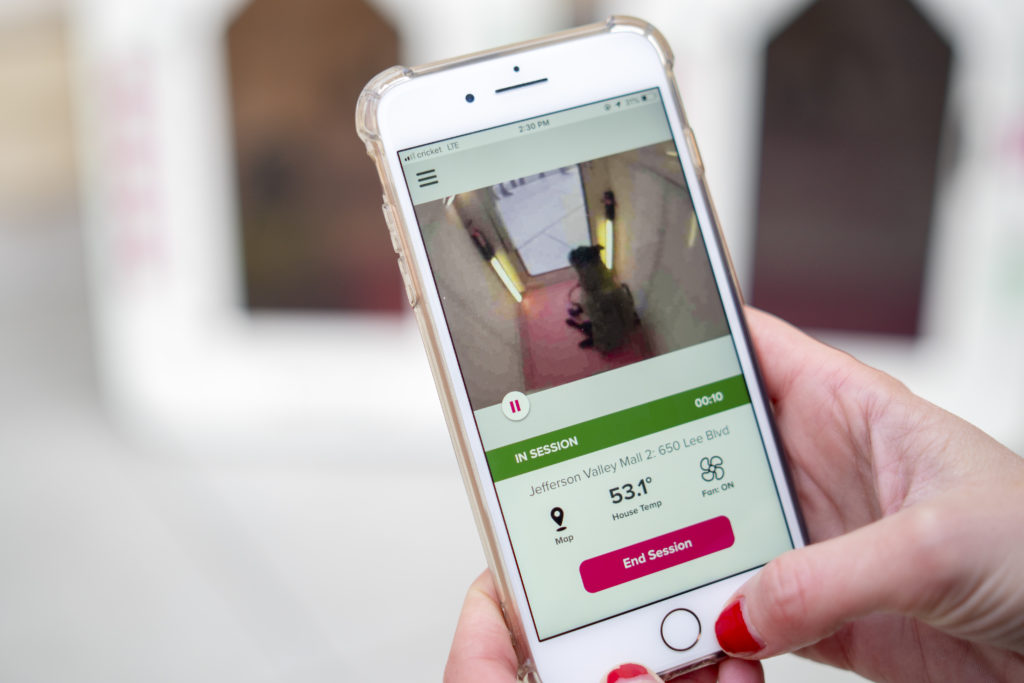
Via the app, users can watch their pooches while shopping.
The startup, built on the Microsoft Azure cloud platform, blends elements of the sharing economy, like sidewalk bike and scooter rentals, with the convenience of self-serve kiosks, such as Redbox and Coinstar – a unique business concept that Brownridge dubs “the future of dog friendly.”
Users download the free DogSpot app, which lets them locate and reserve local DogSpot doghouses via a digital map. When a customer arrives with their pooch, they unlock the door by using the app or by tapping their RFID-enabled member card against a sensor on the house.
They buy time at 30 cents per minute up to a maximum of 90 minutes. (Sessions average about 15 minutes.) The animal enters. The door locks on the shelter, which is spacious enough to accommodate dogs up to 100 pounds.
Users can check on their pup via a doghouse camera, monitor the temperature inside the insulated structure and track their remaining time – information that’s streamed to the cloud and their mobile device.
When their tasks are complete, users end the session via the app. The door unlocks only when the user is present. Afterward, hospital-grade, ultra-violet lights bathe the floor and walls to kill bacteria, molds and viruses, including parvovirus. (The units also are hand-cleaned, as needed, each day.)
“It’s a little safe haven,” says Stephen Ligambi, a Brooklyn resident who uses DogSpot once or twice a week to grab groceries amid urban strolls with Ellie, his Labrador Retriever-mix puppy.
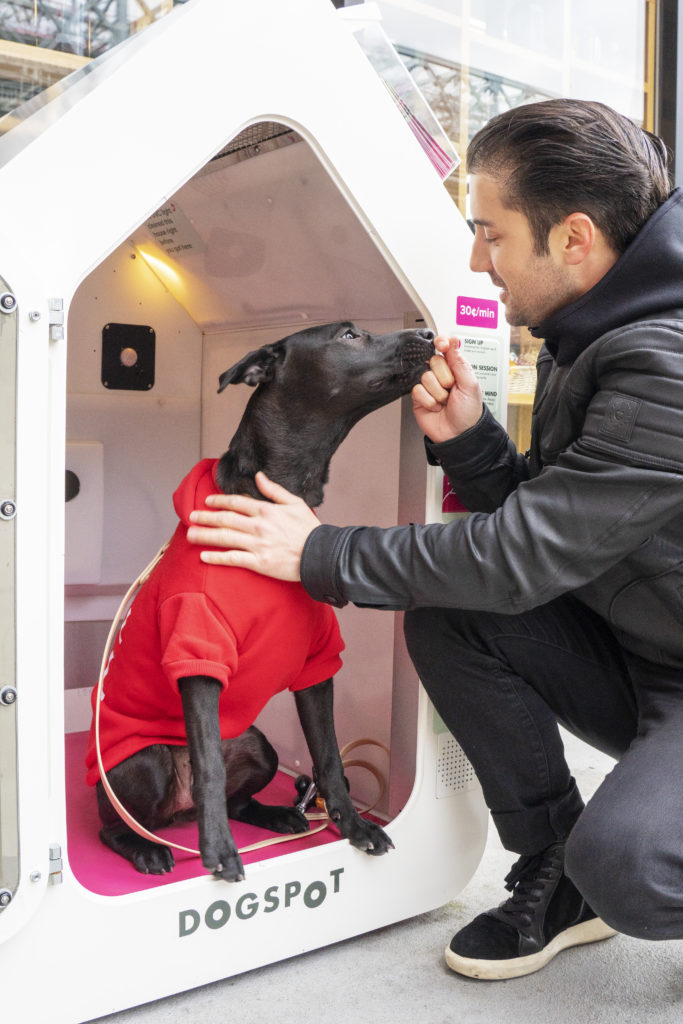
Stephen Ligambi and Ellie.
On a recent Tuesday in Brooklyn, Ellie romped in a dog park with Ligambi before he stopped to fetch supplies at City Acres Market, just below the Williamsburg Bridge.
“DogSpot is more for me! It allows me to do my errands more efficiently,” Ligambi says.
Launched as a pilot in 2016, DogSpot’s inspiration came from – of course – a dog.
Brownridge’s high-energy terrier mix, Winston, used to show “his disappointed face,” she says, whenever Brownridge left her Brooklyn apartment to run errands without him. Many local businesses don’t allow dogs and Brownridge didn’t want to leave Winston, now 6, tied up on the sidewalk.
“It started as a personal problem,” she says.
Then she realized that millions of other pet parents faced similar challenges. Brownridge and fellow co-founder Todd Schechter designed the smart doghouses and placed them outside shops in Brooklyn in partnership with the shop owners.
They also benefitted from the Microsoft for Startups program, which gives fledgling companies access to technology, providing them go-to-market aid and fueling growth of their customer and revenue bases.
Now, they are taking their idea national, having launched in cities and towns across 13 more states, including Connecticut, Missouri, Michigan, Nevada and Texas. They also have locations coming soon in seven additional cities, including Washington, D.C. and Seattle, Washington.
Brownridge expects to have 300 doghouses deployed by summer with thousands more to follow. Her vision is a network of DogSpots in every walkable U.S. city.
“As our understanding of the need for dog owners deepened, we also began to understand how many other audiences would benefit from this solution – namely store owners,” Brownridge says.
Businesses pay DogSpot a monthly licensing fee to have the units situated just outside their entrances. In addition, sponsoring companies pay DogSpot to have their names featured on the houses.
A bump in foot traffic then follows. According to DogSpot’s analytics, 48 percent of its users have switched where they shop based on the doghouse locations. What’s more, 40 percent of DogSpot customers have made an unplanned trip into a store to make a purchase – simply because they saw one of the smart shelters outside while they were walking their dogs.
Grocery stores are the most popular spots. Other placements include specialty retailers (such as a bakery and a spa), highway service areas and a half dozen shopping malls.
About an hour’s drive north of Brooklyn, two DogSpots rest near the main entrance of Jefferson Valley Mall in suburban Westchester County, New York. Magenta lettering on the units reads: “Yes it has A/C & air holes. No they don’t use it as a bathroom. Yes it locks. No they don’t freak out. Yes, we’re serious.”
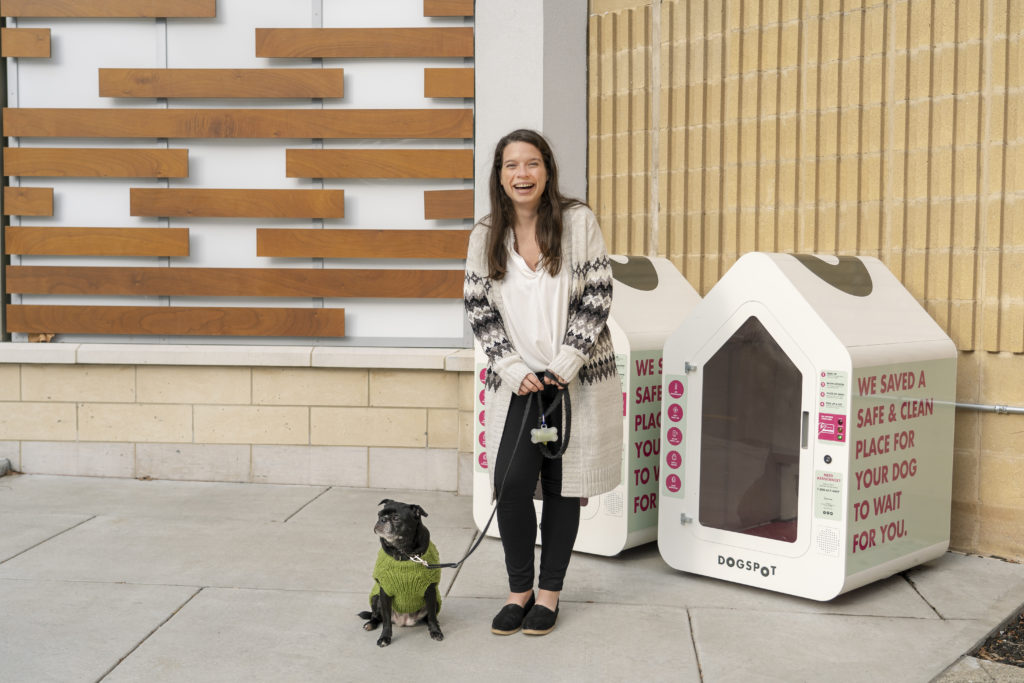
Alexa O’Rourke welcomes a dog to Jefferson Valley Mall.
“People definitely talk about them,” says Alexa O’Rourke, general manager of the mall, which attracts high weekend foot traffic and is a favorite location for stay-at-home moms and their families. “They’re sparking a new way of thinking.”
The doghouses mesh with O’Rourke’s ongoing work, she says, to make the mall feel “uber local” by underscoring “a sense of belonging for all cultures and a sense of community.”
“People are getting comfortable with them, asking: ‘What is this cool thing?’ And they are loving that it’s connected to your phone and that you can see your dog when you’re shopping,” O’Rourke says.
Malls and outdoor shopping centers are fueling DogSpot’s suburban expansion in places like Somerville, Massachusetts and Watertown, Wisconsin.
“I grew up in Charlotte, North Carolina – which is definitely not Brooklyn, New York,” Brownridge says with a laugh. “So I have an idea of the need for this in places outside of dense cities.”
Amid the company’s rapid growth, however, one element of the business has stayed true to the tale, as seen on the DogSpot website.

Winston. (Courtesy of DogSpot)
Pictured just between Brownridge and Schechter – and listed as a “co-founder” – there is Winston, sitting like a good boy, ears perked and tongue out.
Top image: Coconut and Katie check out the world through the window of a DogSpot doghouse in Brooklyn.
Photos by Jason Tanaka Blaney.

